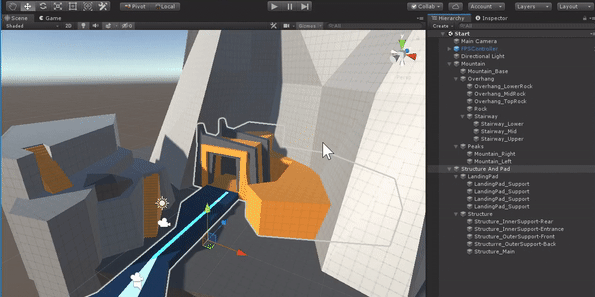Unity 2019.1 ships

Originally posted on 1 February 2019. Scroll down for news of the final release.
Unity Technologies has released Unity 2019.1 in beta. The first of this year’s cycle of updates to the game engine adds a scene visibility system and extends the functionality of the experimental GPU lightmapper.
New scene visibility controls and visual shortcut manager, better GPU lightmap baking
For artists, key changes in Unity 2019.1 include the new scene visibility (SceneVis) controls, which enable users to show or hide objects in the Scene View without changing their visibility in-game.
Visibility can be toggled via keyboard shortcuts or from the hierarchy, as shown above.
The GPU Progressive Lightmapper, a GPU-based alternative to the existing CPU-based lightmap baking system introduced as a tech preview in Unity 2018.3, has also been updated.
It now supports double-sided GI on materials and shadow casting and receiving on meshes, and is now enabled in the Linux and macOS versions of the Unity editor as well as Windows.
The update also makes it possible to manipulate particle data using the new C# Job System.
Workflow changes include a new Shortcut Manager: a visual interface for mapping editor hotkeys.
Programmers get an experimental new incremental garbage collection system, clickable stack trace links in the editor console, and improvements to the process of generating and debugging Android builds.
Updated 17 April 2019: Unity 2019.1 is now officially shipping.
As well as the changes listed above, the Lightweight Render Pipeline (LWRP), first introduced in Unity 2018.1, is officially out of preview, and gains support for dynamic scaling on mobiles with high-resolution displays.
Its desktop counterpart, the High Definition Render Pipeline (HDRP), remains in preview, but gets a wizard for configuring project settings, a new debug mode, and a number of workflow improvements.
Post-processing effects, previously available via the Post-Processing Stack add-on, have also been integrated directly into the HDRP, although this breaks compatibility with the current version of the stack.
The underlying Scriptable Render Pipeline (SRP) adds support for the AxF format for measured materials, used in a range of other DCC applications, and a new hair node based on the Kajiya-Kay lighting model.
Lighting in general sees some significant changes, with exposure now being calculated during rendering rather than as a post effect, permitting much higher light intensity values.
Reflection probes can now be baked on the GPU, and real-time planar reflections are now supported.
For rendering, Unity now supports Nvidia’s now-industry-standard GPU-based OptiX denoiser, along with multiple importance sampling, reducing the number of samples needed to generate a noise-free image.
Other graphics-related changes include the option to ‘prewarm’ a simulation in the new Visual Effect Graph, enabling users to build up simulations to a desired starting state.
There are also improvements to Timeline, Unity’s cinematics editing toolset; to the Sprite Shape and 2D animation toolsets; and support for H.265 video encoding. You can find a full list via the link below.
Separate previews of RTX hardware-accelerated ray tracing and USD support
In separate news, Unity Technologies has released a Windows-only preview of the RTX hardware-accelerated ray tracing system it announced at GDC 2019, which is due to ship in Unity 2019.3.
The source code is available on GitHub, and compiled binaries can be downloaded here.
The company has also released a preview package introducing support for USD, Pixar’s Universal Scene Description format for exchanging complex VFX scene data between applications.
Pricing and availability
Unity 2019.1 is available for Windows 7+ and macOS 10.12+.
The software is available on a rental-only basis: free Personal subscriptions have a non-editable splash screen and can be used by anyone with revenue of up to $100,000/year.
Paid Plus and Pro plans cost $35/seat/month and $125/seat/month respectively.
Read a list of new features in Unity 2019.1 on Unity Technologies’ blog
